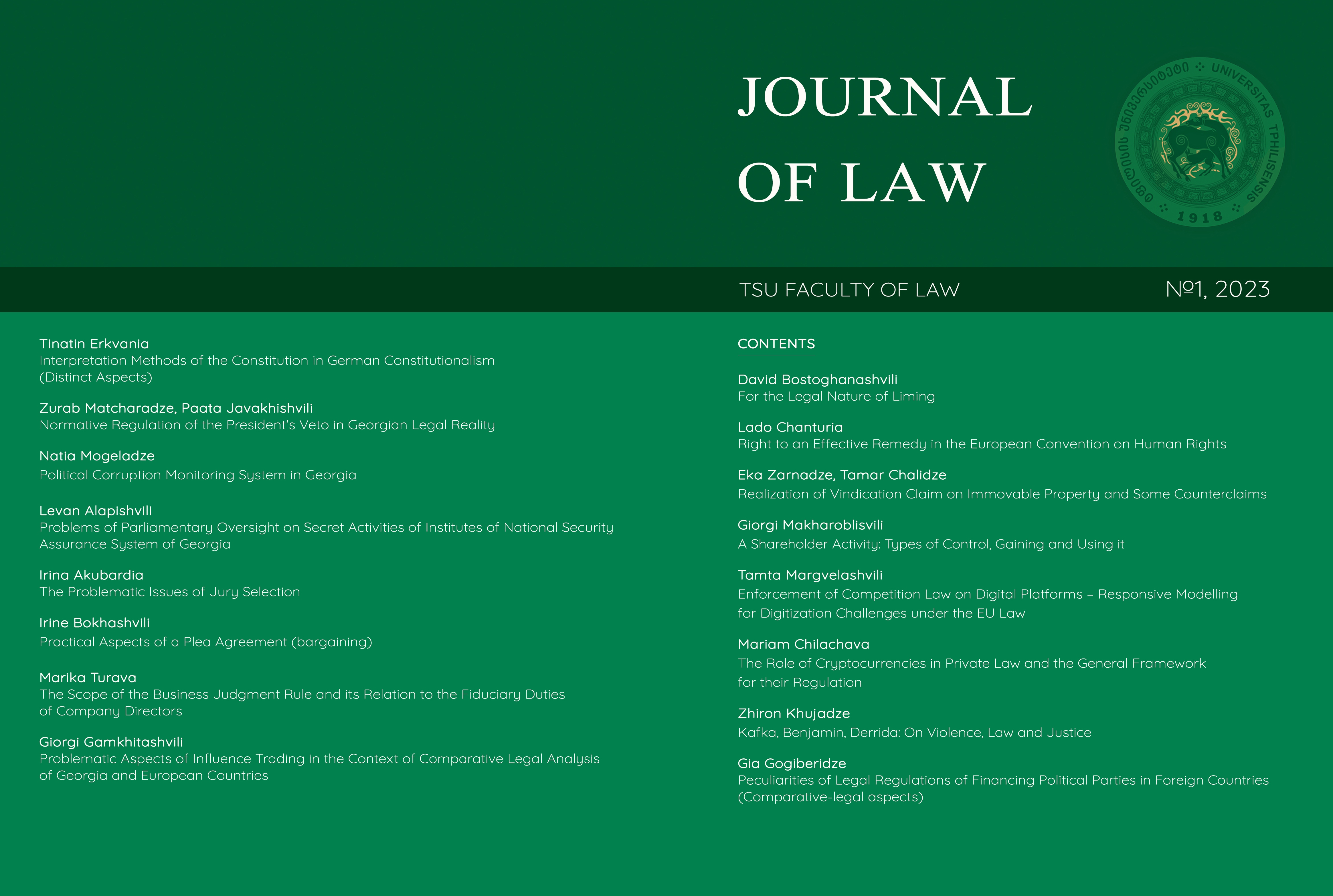The Problematic Issues of Jury Selection
DOI:
https://doi.org/10.60131/jlaw.1.2023.7071Keywords:
jurors, selection, incompatibility, self-recusal, justified and unjustified recusal, party.Abstract
It is known that the jury is not an institutionally separate legal entity. It functions alongside the Court of First Instance and is a special form of administration of justice. Unlike ordinary proceedings when a judge makes a decision based on the law, a jury trial relies on the opinions of ordinary citizens applying to their "inner voice" - conscience, "common sense", folk wisdom and intelligence, public morality, sense of justice. That is why jury trial is considered the highest expression of democracy. It is an interesting institution in many ways. The article reviews the problematic issues of jury selection.
The article analyses theoretical and practical aspects of selecting non-professional judges, the preconditions of their selection, recusals and the jury composition. Legislative changes have been evaluated positively, but there are still challenges. Accordingly, the problems associated with jury selection are identified and the specific recommendations are made to prevent the process from delaying and choose independent, unbiased jurors.
References
Criminal Procedure Code of Georgia, 09/10/2009 (in Georgian)
Bachmeier U.L., Daly B.L., Gerald T., Comparative Analysis: Systems of Trial by Non-Professional Judges in the Member States of the Council of Europe, Tbilisi, 2013, 10, 60 (in Georgian).
Commentary on the Criminal Procedure Code of Georgia, Authors' Collective, Tbilisi, 2015, 673 (in Georgian).
Gabisonia I., Courts of Jury, Magistrates and Conciliation (Mediation) , Tbilisi, 2008, 447 (in Georgian).
Guide to Judicial Skills, American Bar Association, 2012, 58, 65-66, 67-68, 95-98 (in Georgian).
Gutsenko K., Golovko L., Filimonov B., Criminal Law Process of the Western States, translation, Gogshelidze R. (ed.), 2007, 175 (in Georgian).
Interview with judge Eka Areshidze, see Georgian Court Watch, https://courtwatch.ge/articles/ekaareshidze/ [25.02.2023] (in Georgian).
Iorhandi L., Tsikarishvili K., Court of Jury, Review of Western Systems, Tbilisi, 2009, 32, 34 (in Georgian).
Joint Opinion on The Criminal Code of Georgia, OSCE/ODIHR and Council of Europe, Opinion-Nr.: CRIM – GEO/257/2014 [RJU], Warsaw/Strasbourg, 22 August 2014, §26.
Jury court, History of Origin and Development, Supreme Court of Georgia, Tbilisi, 2010, (in Georgian) http://www.supremecourt.ge/files/upload-file/pdf/finaljudge.pdf [23.01.2023].
Jurors in Criminal Proceedings, Human Rights Network of Georgia, GNHR, Tbilisi, 2016, 12, 39 (in Georgian).
Jury Institute (characteristics and problems), Caucasus International University, Tbilisi, 2017, 44 (in Georgian).
Kovalyov N., Analysis of the draft law on amendments to the Criminal Procedure Code of Georgia regarding the jury trial, 2016, Jurors in criminal proceedings, Human Rights Network of Georgia, Tbilisi, 2016, 55 (in Georgian).
McBride J., Ensuring that the Operation of Jury Triuals in Georgia Are Fully in Accordance with European Srandards, Tbilisi, 2017, 14-15 (in Georgian).
Widman N., Jury trial (Common Law Countries), 2005, 33 (in Georgian).
Widman N., Hans P.V., American Jury, Verdict, 2019, 120, 103 (in Georgian).
Decision of the Constitutional Court of Georgia on November 13, 2014 in case N1/4/557,571,576, II-98 (in Georgian).
Kristiansen v. Norway, no. 1176/10, 17/12/2015.
Hanif and Khan v. United Kingdom, no. 52999/08, 20/12/2011.
Procedo Capital Corporation v. Norway, no. 3338/05, 24/09/2009.
Holm v. Sweden, Application no. 14191/88, 25 /11/ 1993.
Piersack v. Belgium, Application no. 8692/79, 1/10/ 1982, §30.
Downloads
Published
How to Cite
Issue
Section
License

This work is licensed under a Creative Commons Attribution-ShareAlike 4.0 International License.









